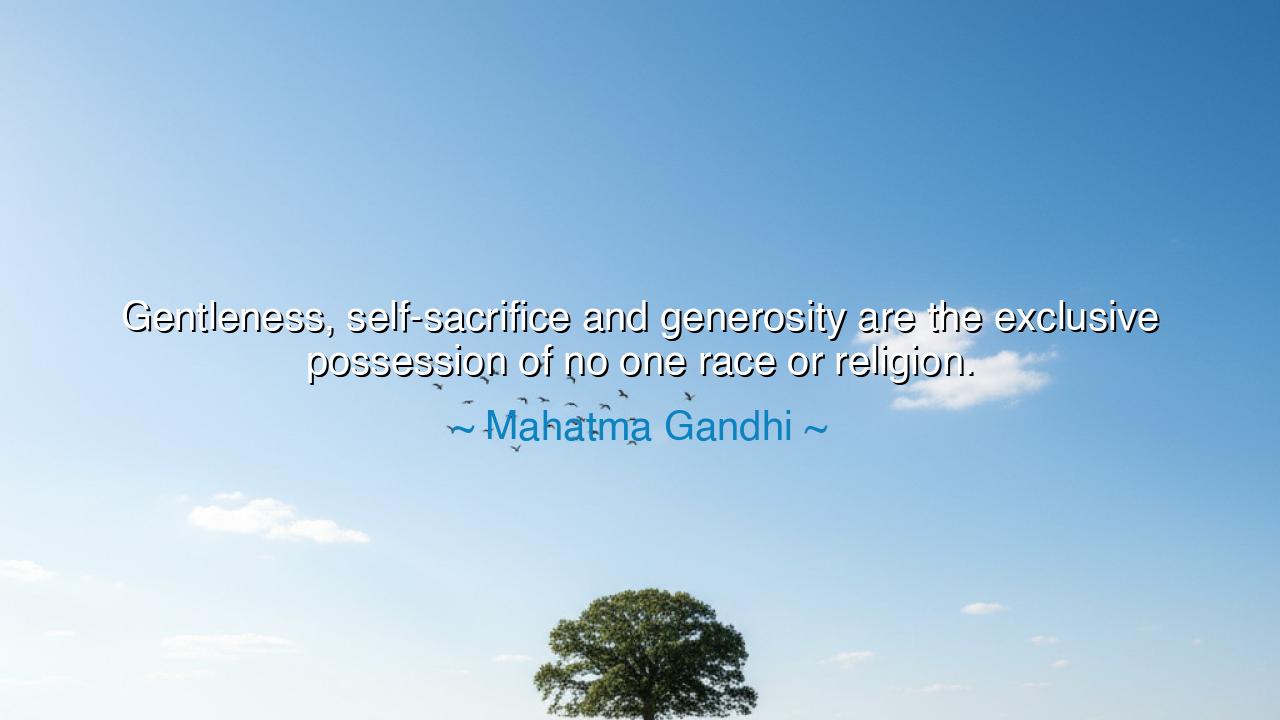
Gentleness, self-sacrifice and generosity are the exclusive
Gentleness, self-sacrifice and generosity are the exclusive possession of no one race or religion.






In the ancient echo of wisdom, where the heart’s deepest yearnings are often wrapped in the universal truths of humanity, Mahatma Gandhi’s words speak with profound clarity: "Gentleness, self-sacrifice and generosity are the exclusive possession of no one race or religion." These words ring out, not just as a call for personal virtue, but as a challenge to the very boundaries we have constructed between ourselves and others. Gandhi’s insight reminds us that the highest virtues of the human spirit—gentleness, self-sacrifice, and generosity—are not confined to any single culture, race, or religion. They belong to all of us, and their true value is found when we recognize that they transcend the artificial divisions we create.
Gentleness, in the ancient world, was often revered as a quality of the noble soul. It was understood not as weakness, but as strength—the strength to control one’s emotions, to respond with kindness and patience, even when anger or hatred might seem justified. The Buddha, in his teachings, exemplified this quality of gentleness, urging his followers to embrace compassion in the face of suffering. Confucius, too, spoke of the importance of gentle governance, where rulers should lead not with force, but with the grace and wisdom that comes from a calm heart. Gentleness, as Gandhi suggests, is not bound to any one tradition but is a virtue that transcends time and culture, teaching us to treat all beings with respect and care.
Self-sacrifice, too, is a quality that has echoed through the ages as a universal ideal. Christ on the cross, Buddha giving up his princely life for the search of truth, and Muhammad facing trials to uphold justice—each of these great figures demonstrated self-sacrifice not for personal gain, but for the welfare of others. Gandhi, in his own life, embodied this principle by dedicating himself to the service of the Indian people, renouncing his own comforts, wealth, and even his freedom for the cause of justice and freedom. He believed that self-sacrifice was not a sign of weakness but a powerful means to transform society. It is a force that binds us all, regardless of race or religion, to the suffering of others and calls us to take action for the collective good.
Then there is generosity, that unspoken force of giving, which does not ask for recognition or reward but is driven by a deep love and compassion for others. The ancient Greeks celebrated generosity as a divine gift, where the act of giving not only benefited the recipient but enriched the giver’s own soul. Socrates taught that true generosity comes not from material wealth but from a generous spirit, willing to give knowledge, time, and love to others without expectation. Gandhi’s generosity, too, was not just about material giving, but about offering his own soul to the cause of truth, nonviolence, and equality. He believed that generosity is not confined to riches, but extends to one’s time, energy, and heart, and it is this selfless generosity that can transform the world.
In Gandhi’s view, these virtues are not tied to any particular race or religion. The Christian, the Muslim, the Hindu, and the Buddhist can all live by these principles, for they are not bound by cultural or religious distinctions but are part of the universal human condition. Consider the example of Mother Teresa, who, though rooted in Christian faith, showed the world that gentleness, self-sacrifice, and generosity were virtues that could transcend religious boundaries. Her life, dedicated to serving the poor and dying in the slums of Calcutta, was an embodiment of these virtues. In her actions, she proved that these qualities belong not to one group but to the collective human spirit.
The lesson Gandhi teaches us is that the true beauty of humanity lies in the recognition that these virtues—gentleness, self-sacrifice, and generosity—are not the exclusive possession of any one people or tradition. They are what make us human, and when we embrace them, we move closer to the truth that unites us all. It is not enough to speak of love or compassion; we must live them, embody them in our daily lives, regardless of our race, religion, or culture. This is the path to a unified humanity, where differences are respected, and common virtue is the foundation of a just and peaceful world.
In practical terms, let us strive to practice these virtues in our own lives. Gentleness can be shown through patience and empathy in our dealings with others. Self-sacrifice can take the form of choosing the welfare of others over personal gain, whether through our actions or our time. Generosity can be expressed in how we share not only material goods but also our love, care, and wisdom with the world. Let us act with the knowledge that these universal virtues are not the property of any one group, but the essence of our shared humanity. By doing so, we honor the legacy of Gandhi and the ancient wisdom that teaches us that through these virtues, we can heal the world and elevate the human spirit.






AAdministratorAdministrator
Welcome, honored guests. Please leave a comment, we will respond soon